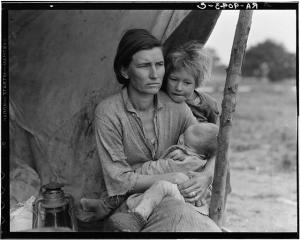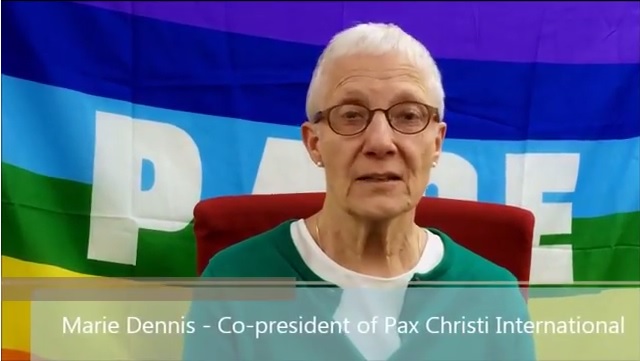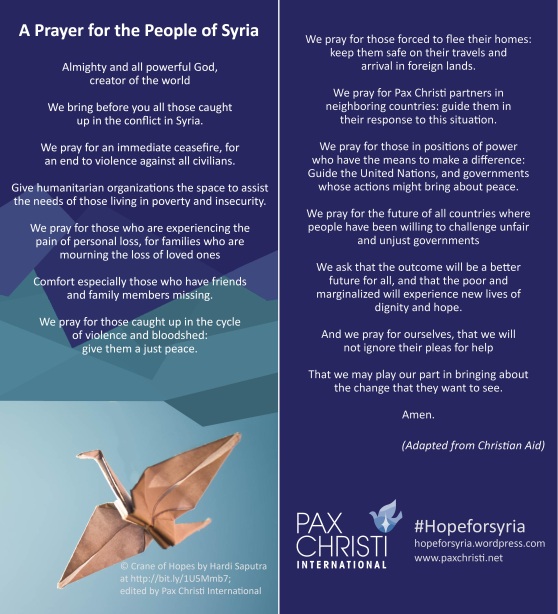Written by Fr Bobby Gilmore, President of the Migrants Rights Centre Ireland
Migrant Madonnas
Europe is already guilty of causing the deaths of many migrants by giving them, in effect, no alternative but to risk their lives at sea or on the tracks leading into the Channel tunnel. (The Guardian. 2/3/16)
A famous picture by Dorothea Lange from an infamous migration in the previous century was brought to life by a similar picture in today’s media. The woman sitting with her children in the shade of a makeshift tent on Route 66 all those years ago with the title-Madonna of Route 66-as they made their way in that mass migration is vividly recalled by a similar picture in today’s newspapers of a Syrian mother watching over her children on the Greek-Macedonian border. They are trapped there because of the inability of European Union Member States to devise a common policy in managing a humanitarian crisis that has been looming for the past several years. Apparent now are echoes of the Evian Conference of 1938.

Migrant Mother – Dorothea Lange
There was great enthusiasm at the onset of the Arab Spring when a poor man set himself on fire in protest against the regime in Tunisia. It spread to Egypt, Libya and other autocratic destinations in the Middle East such as Syria. It seems that little attention was paid to the possible outcomes and displacement of such liberation movements. The autocrats ousted with western support, terrible as they were, left power vacuums that a variety of tribal leaders were unable to fill resulting in chaos and confusion. Tunisia survived intact because there was a strong democratic element in society that filled the gap left by the departing ruler. There is no prevailing authority in Libya. As a result people traffickers rule the area sending immigrants in rickety craft into the Mediterranean headed for European coastlines. Southern European Union Member States are overwhelmed with destitute arrivals.
Later, there was an assumption that regime change would happen quickly in Syria. Turkish politicians assumed that it would happen over a period of a few months. The struggle for Syria has been going on for five years. It has become an international struggle. Millions of people have been displaced. Many are in refugee camps in neighbouring countries. Initially, these refugees saw themselves in temporary situations. Like government leaders in the region and beyond, they expected that an immediate return would be possible after the removal of the regime. However, as time dragged on the hope of return receded. The human spirit refused to be quieted by official promises of an end to the conflict. Mass migration headed for Europe from the refugee camps began.
It was and is akin to mass migration out of Europe to the Americas and beyond in previous centuries. Once started by rumour and anecdotal information it took on a momentum of its own. Obstacles on land and sea as in the past were overcome. The Turkish administration in whose country many of the refugees were sheltering turned a blind eye to the mass movement towards the Aegean and the Greek Islands. Many perished in the sea crossings.

Migrant Mother – Dorothea Lange
The European administration was ambivalent to the impending catastrophe. Official confusion and inaction waited for the next tragedy to happen forcing knee-jerk solutions rather than a cohesive response. European mainstream political parties allowed splinter, anti-immigrant coalition partners to dictate the pace of responsive cohesive, burden-sharing policies. A positive response was made by Mrs Merkel. Germany led the way and some others grudgingly followed.
Tragically, Europe reverted to what it hated during the Cold War era-walls, fences, border-police, dogs, tear gas, water cannon and baton rounds. Some European Union Member States shamefully copied the disgraceful tactics of the Soviet era. Imagine the feelings of Syrians running from the terrorism of war being treated worse in what they envisioned as safe havens. One woman guarding her children from border police remarked that she “didn’t expect to be treated like an animal in Europe.” Sadly, as at Calais, Europe is seen to be animalising humans and humanising animals. The use of the word “jungle” to describe the conditions of those trapped there typifies European attitudes to those who are different.
Really, what spurred the European Union directorate to action was and still is the humanitarian response by the general public to the refugees. The public response was far ahead of the institutional response. Since its formulation the Member States of the European Union have dithered about a common immigration policy. If such was agreed the deprivation now witnessed at border crossings in Europe could have been avoided. Traffickers would be redundant. Refugees would not be used as a weapon by interested powers to attain a variety of strategic interests one of which is the disintegration of the European Union.
Many of the scenes of people fleeing with their few belongings are biblical. More importantly these are reminders of our own European histories and the reasons why international conventions and declarations have had to be put in place. There is a need in modern times for a new Egypt. No European Member state has signed the United Nations Declaration on the protection of migrants and their families.
Joseph got up took the child and his mother and left that night for Egypt, where he stayed until the death of Herod. (Mt. 2-14)










Pingback: PAX CHRISTI INTERNATIONAL: Participate in the #HopeforSyria campaign this week, March 15-20 | PAX CHRISTI USA